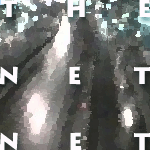Elizabeth Hand has become the reigning mistress of the appealing apocalypse. In each novel she creates such intriguing possibilities for global destruction that the reader usually does not wish to see the crisis averted, but instead eagerly and gleefully watches as doom descends. I loved her last novel, Waking the Moon, but unfortunately it was the one novel in which she wimped out and let the novel end with everything returning to status quo. Not so her latest novel, Glimmering.
The novel begins in March 1997, with a large-scale ecological disaster creating permanent changes in the earth's atmosphere and magnetic field, resulting in an effect called the glimmering, a frenzy of colorful energy discharges filling the sky both day and night. The glimmering interferes with global communications and creates intermittent local electrical problems. The glimmering descends during the fortieth birthday celebration of Jack Finnegan.
Finnegan is the heir to what was one of largest mercantile fortunes in America, an inheritance he has used to maintain the publication of the last extant literary magazine. After discovering he is HIV-positive, his only remaining obsession becomes seeing his magazine published in the new millennium. In this endeavor he is helped sporadically by his ex-lover Leonard Thrope, whose assistance usually come with unexpected strings.
Thrope is an icon for a society that has embraced fatalism. He travels the world taking pictures of the dying and the near extinct, whether human or animal, and gives back to an eager audience images that glorify death. From his travels, he also brings to Jack a mysterious elixir, which purports to be a cure for AIDS, but which soon begins to seem like the path to something far more transforming.
Trip Marlowe is a singer with the world's most popular Christian (or "Xian") band, whose appeal allows him to crossover into the mainstream, where Leonard Thrope immortalizes him in a virtual reality danse macabre that is eagerly embraced by a society that is already reveling in its own mortality.
Trip, who has always lived a cloistered life, become obsessed with Marz Candry, the Hyacinth Girl, who is haunted by death but offers the promise of new life. When Trip becomes separated from Marz, he is aided by the dying Martin Dionysos, who had once stolen Thrope's affections from a young Jack Finnegan, but who is now Thrope's greatest critic. Dionysos is the one artist left who has tried to glorify life instead of death, but he himself is succumbing the final stages of AIDS.
As the characters journey toward what promises to be an apocalyptic meeting on the eve of the millennium, they travel across a world which seems increasingly empty. As lines of communication and transport are cut off, the people just stay in their homes and await the end.
In a book that is liberally sprinkled with allusions to both T.S. Eliot's The Waste Land and the lyrics of Kurt Cobain, Hand mixes historical millennial anxieties with the most recent trends in American culture. Instead of exploring the mechanics of catastrophe, she outlines how easy it could be for our society to not only become resigned to destruction, but to welcome the onslaught with frenzied anticipation.
While reading this book, I became aware that while my intellectual engagement with the story waxed and waned, my emotional reactions were continuous. Passages were unsettleing not because they were specifically horrific, but because it was not clear whether the descriptions were intended to provoke a positive or a negative reaction. Hand has a talent for evoking beauty in her descriptions of the terrifying, and for making the exquisitely beautiful have a terror of its own. There is a scene in which Thrope is recording a "virtual reality" video of Trip Marlowe singing. Thrope gives Marlowe a hallucinogen, and the descriptions of Trip's perceptions while he is "tripping" left me as disoriented as any designer drug. We all have felt that uneasy balance between fascination and revulsion, but Hand puts the experience to paper as well as any writer I have ever encountered.
At one point in the novel, Finnegan receives an invitation to a New Year's Eve party: December 31st, 1999. The invitation begins "Far away, in a golden pyramid, live 6 or 7 shamans. By using Sorcerous Science, they change the most everyday journey into a Millennial Mystery Trip." In a sense, that is what Hand herself has done. From a mundane launching point, she sends us on a surreal and kaleidoscopic journey to what may be oblivion or what may be apotheosis. Along with this novel, try a quick rereading of Eliot's The Waste Land as well, if only for an awareness of how Hand's allusions deviate from the poem in an unexpected direction. This is the way the world ends, not with a whimper, but with a bang.



